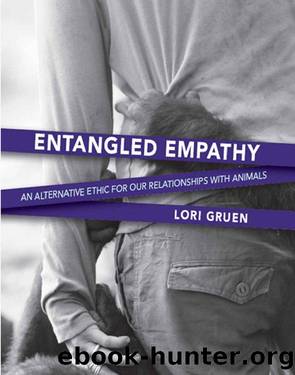2020-07-06 23:49:14.980629 by Unknown

Author:Unknown
Format: epub
A Common Misconception about Empathy: Projection
One criticism I have heard a number of times about empathy, and to which I already briefly alluded in the discussion above, is that empathy can be reduced to a kind of “ narcissistic projection ” of our own interests and desires onto others, particularly nonverbal others. This is a serious concern in animal-protection work where the desires that humans have about the wellbeing of nonhumans often gets substituted for their actual wellbeing. These desires come in two forms: direct desires, when we think another animal is lonely or sad or afraid, when in fact it is we who are feeling lonely or sad or imagine the animal will be afraid; and mediated desires, desires that stem from ideological commitments that are then projected onto animals.
With these two forms of desires come two forms of projection. The first is very familiar. Those of us who live with animals or work directly with them usually know a lot about the animals we spend time with, but we also have to keep an eye on our projections. As I ' ve mentioned, since dogs are so prone to pick up our emotions, it is likely that projection can turn into a cycle. For instance, I might feel scared about taking Fuzzy, my rescued greyhound, to the veterinarian, and then Fuzzy, picking up on my fear, gets frightened. Once we arrive, I suggest to the vet that I have to stay with Fuzzy as he is too afraid. The veterinarian, picking up on my anxiety, thinks it would be better if Fuzzy wasn ' t with me during the examination.
Another example might be that I see a sick hen and believe she wants to be cuddled. I might sincerely feel that I can detect how much she wants to be cuddled, but what is really happening is that I ' m accurately picking up on her feeling sick but then projecting my own wish to be cuddled when I ' m sick onto her In this circumstance, the sick hen might be better off left alone, because contact with scary mammals stresses chickens out further rather than making them feeling comforted. 39
An audience member at a conference at Hunter College once asked Peter Singer whether or not we should stop predation to eliminate animal suffering. Although he responded that he thought human interference had led to more harm than good, Singer replied that he would want to stop chimpanzees from fighting, if it could be done. Anyone who has witnessed chimpanzee altercations cannot help but respond with fear at the awesome violence they sometimes engage in. But fighting among chimpanzees is centrally important to their social interactions. It allows them to establish or reestablish their social hierarchy and, once the fighting is over, to engage in reconciliation, which strengthens social bonds. Stopping chimpanzees from ordinary fighting and altercations (with the possible exception of fatal conflicts) would actually be contrary to their interests and represents a form of projection and thus a failure of empathy.
Download
This site does not store any files on its server. We only index and link to content provided by other sites. Please contact the content providers to delete copyright contents if any and email us, we'll remove relevant links or contents immediately.
Sita - Warrior of Mithila (Book 2 of the Ram Chandra Series) by Amish(53720)
The Crystal Crypt by Dick Philip K(36371)
Cat's cradle by Kurt Vonnegut(14695)
Always and Forever, Lara Jean by Jenny Han(14421)
Ready Player One by Cline Ernest(13913)
The Last by Hanna Jameson(9769)
Year One by Nora Roberts(9268)
Persepolis Rising by James S. A. Corey(8904)
The remains of the day by Kazuo Ishiguro(8340)
Never let me go by Kazuo Ishiguro(8244)
Red Rising by Pierce Brown(8198)
Dark Space: The Second Trilogy (Books 4-6) (Dark Space Trilogies Book 2) by Jasper T. Scott(7873)
The handmaid's tale by Margaret Atwood(7408)
The Circle by Dave Eggers(6808)
Frank Herbert's Dune Saga Collection: Books 1 - 6 by Frank Herbert(6656)
The Testaments by Margaret Atwood(6434)
Legacy by Ellery Kane(6362)
Pandemic (The Extinction Files Book 1) by A.G. Riddle(6142)
Six Wakes by Mur Lafferty(5782)
